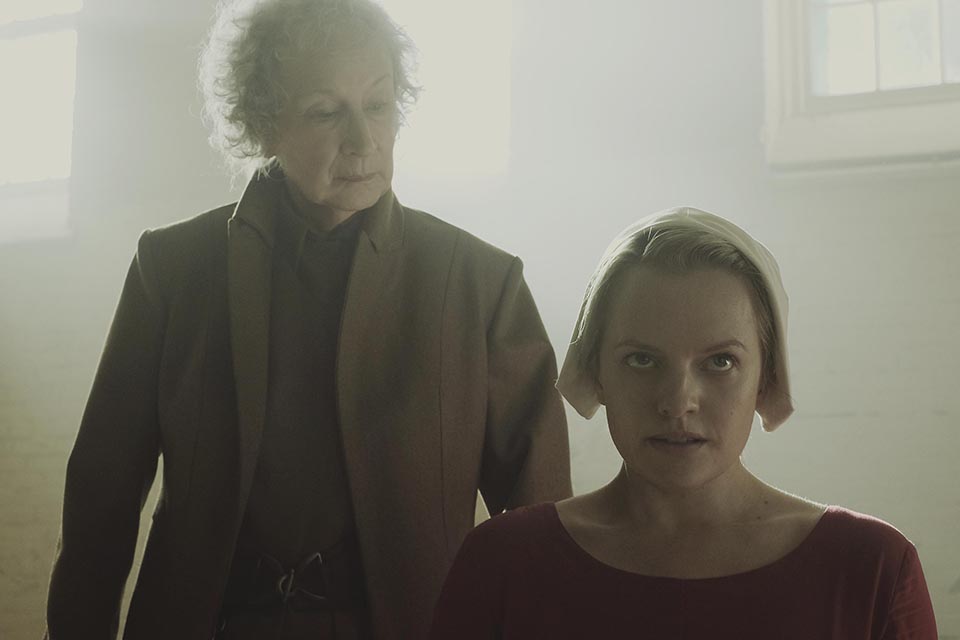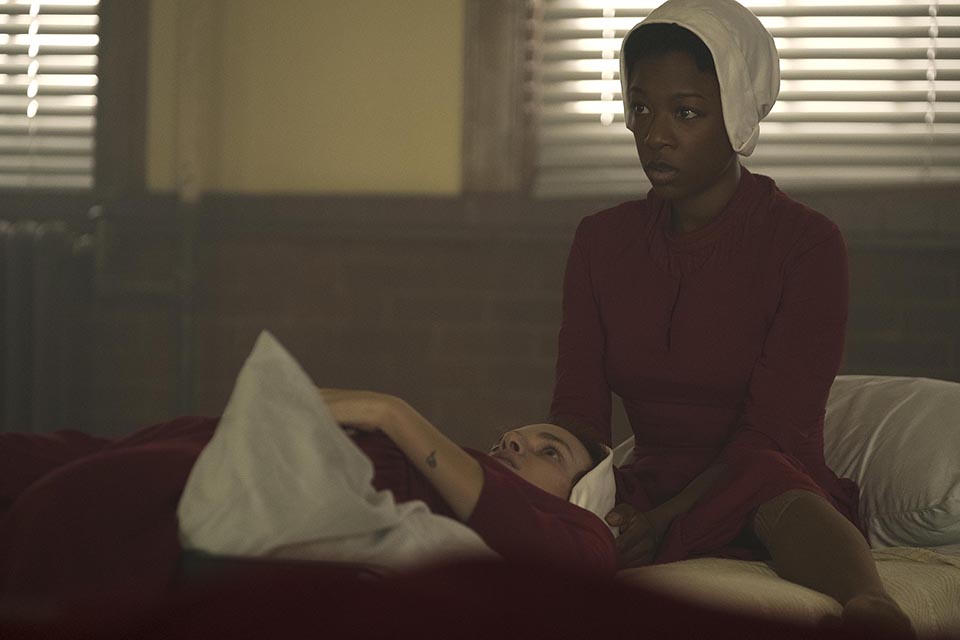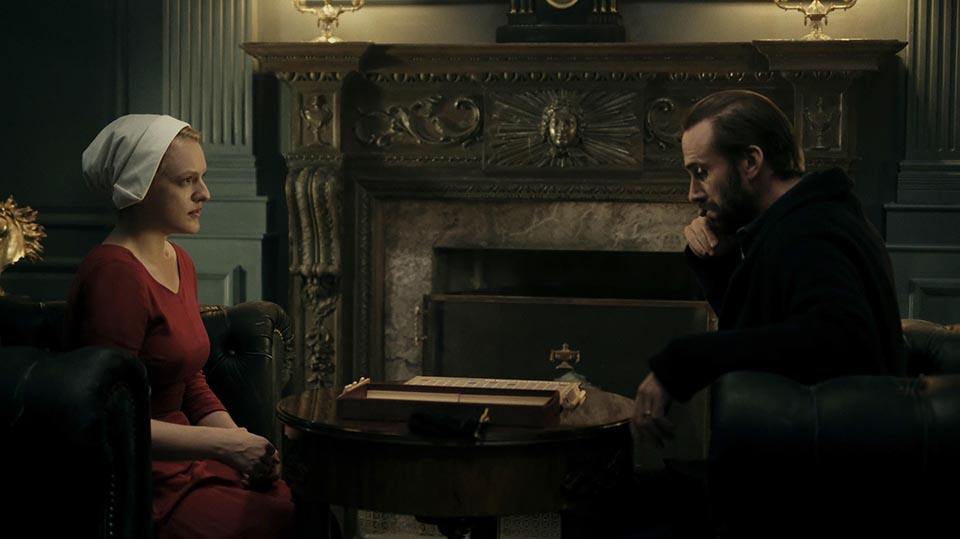- Home |
- Search Results |
- Margaret Atwood: ‘The Handmaid’s Tale is being read very differently now’
Margaret Atwood: ‘The Handmaid’s Tale is being read very differently now’
Since The Handmaid’s Tale hit TV screens in 2017, Margaret Atwood’s already-prominent profile as a feminist has blazed ever brighter. Here she talks about how the novel came to fruition while she was living in Berlin, speaking up and what’s next for feminism.
The sequel to the book The Testaments will publish 2019.

What questions were you trying to answer in The Handmaid’s Tale?
The Handmaid’s Tale was written in 1984, sorry to have been so corny. The 1980s was a decade of pushback against the uprising of the many kinds of feminism in the 1970s. People were saying that they would like women to be back in the home in their rightful sphere, and that all of the gains that people thought they had made ought to be reversed.
And so The Handmaid’s Tale was partly an answer to the question, ‘If you were going to shove women back into the home and deprive them of all of these gains that they thought they had made, how would you do it?’ The answer: you would simply reverse the steps that had led to them being out and active in the world, with jobs and control of their own property and everything else that they had by that time. There was already a quick and easy method for doing that, in the form of the credit card. If all money is controlled electronically (or digitally, as it is now), it can be switched off instantaneously. I’m just saying.
I also wanted to answer the question, ‘If the United States were to become a totalitarianism, what kind of totalitarianism would it be?’ In other words, what would be the slogans? what would be the excuse? It was clear to me that it would not be communism and it would not be anything resembling liberal democracy. It was much more likely, in that country, to have its base in seventeenth century puritanism.
So, I was answering those questions and the conditions of 1984 in which I was answering them meant you could see it coming.
What was life like in Berlin when you were writing The Handmaid’s Tale?
I started The Handmaid’s Tale on a German keyboard typewriter which I had rented. Berlin was encircled by the Berlin Wall. It was a show-piece, of a kind, for Western capitalist merchandising, but it was also a very shadowed place. It was populated by a lot of elderly ladies who had been through the war and also by a number of young men evading the – if you lived in West Berlin you didn’t have to be drafted into the German army. But there weren’t a lot of young families because it was a precarious place. Every Sunday the East German air force would do a flyby in which they would make sonic booms just to remind you that they were there.
But from Berlin we were able to visit East Germany, Poland and Czechoslovakia which were all at that time still part of the Soviet Socialist Republic penumbra; they were satellite states at that time. And that was very atmospherically inspiring, by which I mean that people were very reluctant to talk to you, unless they had a safe place to do it in and unless they were pretty certain that you weren’t going to blow their cover. So I did a certain amount of that. It was pretty instructive, how afraid people were of saying anything that was going to get them in trouble and how careful people from the West had to be not to say, ‘and so-and-so told me this and so-and-so told me that.’
'I still don’t think people believe they are going to have a religious puritanical regime, but the civil war is going on right now'
Have you noticed a difference in young people’s reactions to reading The Handmaid’s Tale now compared with 30 years ago?
When it came out in 1985-6 there were various reactions: in Europe, people were looking to the United States (because it still was the Cold War) as the bastion of democracy, openness, freedom, lack of censorship, and they thought: total fantasy, this will never happen, no, no, no, no, no, no, no…. That’s very different now.
In England it was a jolly good yarn, but with a ‘No thanks, we had our Oliver Cromwell moment back in the seventeenth century’ so it didn’t feel as if they were about to have a religious puritanical regime or a civil war. I still don’t think people believe they are going to have a religious puritanical regime, but the civil war is going on right now. It’s just it’s not a war, it’s the Brexit split. There are two Englands. So even that part becomes a bit more believable.
In Canada – Canadians are always so nervous – they said, ‘Oh could it happen here?’ At that time, maybe not. But we just had a government, the one before this, that was doing a lot of things that Trump is now doing. So nothing is certain anymore, and as for the United States, the pushback is in full swing: you’re seeing women’s reproductive rights being rolled back at a very swift pace.
Conditions changed overnight on November 9, 2016. That’s why you saw those big marches. So yes it’s being read very differently now, unfortunately. I’m not pleased.

How do you keep speaking up in an internet age of fake news, trolling and lazy journalism?
I’m not sure that journalism is always lazy and I’m a great supporter of media who are accountable – that is, if you find that they have published something that is untrue, they are obliged to correct it. It’s one of the antidotes to lazy journalism and internet trolling.
So how do you keep speaking up? Every time that you appear in public in any way someone is going to attack you – I’ve been doing that since the late 60s. There was a great piece by Mary Beard recently, in which she talked about the tradition whereby those who speak in public have, for the last three thousand years or so, been men. So if you are not a man and you say just about anything in public you are going to get a certain onslaught of people who send you hate mail. It used to just be in coloured block lettering through the mail. Now it is on the Internet and it says things like ‘I’m going to cut off your head and rape it’. And if Mary Beard can deal with that, so can I.
'The advent of the Pill ... changed everything. It meant that because you could, you had to. People have to have a rethink about that'
What do you predict is next in this current wave of feminist protests?
Ursula Le Guin has a very good thing on anger, in which she says anger is a tool. So you have a tool, it’s a powerful tool and you use it, but then there's the hard slog of making real changes. So in what areas are those real changes going to be made? A good place to start would be the law.
The whole angry ‘name, shame and blame’ process only works with people who are in the public eye and have something to lose by loss of public favour. It includes people in the entertainment industry, it includes politicians, and it includes CEOs of publicly traded corporations that sell things to the public. If you are making widgets for tanks, you are not in that category. So that leaves a vast penumbra where these shaming techniques are not very effective.
Which is where the law comes in. We need fairer laws and better processes for criminal charges. But in the United States right now I think it would be only on a state level that you might see changes. But on a federal level, with this government? I don’t think so. Institutions in the public eye have also got to look at their processes and Hollywood, which is like a little kingdom of its own, must look at its reporting and accountability procedures.
But in all of this, you need to go back to the Universal Declaration of Human Rights, and the companion document that has to do with women, and see what the rights are actually supposed to be. It gives you an idea of what the standard is and what people signed, what they are supposed to be doing, otherwise you don’t have anything to base your demand for rights upon.
The other area that we have been hearing a lot about is social behaviour: what is supposed to go on, what is expected to go on, in the area we could loosely call dating. This is something that young people are going to have to sort out, to come up with an idea of how they would like it to be different.
One thing that happened between, say, 1960 and now is the advent of the Pill. It changed everything. It meant that because you could, you had to. People have to have a rethink about that. The other thing that happened was the hook-up culture – dating apps and the pornographication of the imagination. Why should anybody be expected to have such a rotten time? I hated being 22, but not for those reasons. Different reasons.

Has being a grandparent had an effect on your environmental campaign work? What is the one thing you would fix or change before your grandson turns 18?
Being a grandparent is wonderful in itself, but my environmental work goes a long way back. I grew up with biologists and with early environmentalists and conservationists, so this is just in my DNA. What is the greatest threat? The greatest threat is ocean death. Should the oceans die, the marine algae that made our oxygen atmosphere 1.9 billion years ago – before which iron didn’t rust because it was methane – will die, and 60-80% of the oxygen that we breathe will die with them. So we’ll still be wheezing, but for how long? It’s a multiple problem, so fix that one and then you at least have the groundwork for fixing the other things.